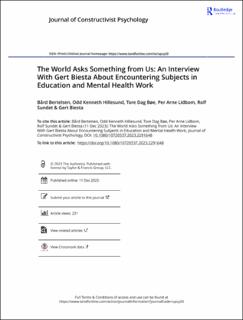| dc.contributor.author | Bertelsen, Bård | |
| dc.contributor.author | Hillesund, Odd Kenneth | |
| dc.contributor.author | Bøe, Tore Dag | |
| dc.contributor.author | Lidbom, Per Arne | |
| dc.contributor.author | Sundet, Rolf | |
| dc.contributor.author | Biesta, Gert J. J. | |
| dc.date.accessioned | 2023-12-28T13:23:47Z | |
| dc.date.available | 2023-12-28T13:23:47Z | |
| dc.date.created | 2023-12-11T18:20:07Z | |
| dc.date.issued | 2023 | |
| dc.identifier.citation | Bertelsen, B., Hillesund, O. K., Bøe, T. D., Lidbom, P. A., Sundet, R., & Biesta, G. The World Asks Something from Us: An Interview With Gert Biesta About Encountering Subjects in Education and Mental Health Work. Journal of Constructivist Psychology, 1-11. | en_US |
| dc.identifier.issn | 1072-0537 | |
| dc.identifier.uri | https://hdl.handle.net/11250/3109039 | |
| dc.description.abstract | This interview with Gert Biesta is part of an ongoing research initiative to explore the relationship between reality, social construction, and professional practices within the mental health field. Biesta’s work has been a critical source of inspiration for this project. Biesta’s work centers on the purpose and aims of education, emphasizing subjectification or the process of engaging with one’s own freedom and becoming a subject capable of navigating the world. Biesta argues for a world-centered rather than child-centered or curriculum-centered education. This is not only because education should provide students with the knowledge and skills necessary to act effectively in the world, but most importantly, because the world is where our existence as human beings takes place. Biesta thus engages with ethics and the connection between education and broader philosophical themes and challenges instrumental approaches in favor of seeing education as having intrinsic value for human growth and democratic citizenship. Although Biesta’s work is primarily concerned with educational questions, his ideas transcend education and can prove productive in other domains. In the interview, we extend the conversation to mental health, seeking areas where Biesta’s ideas resonate. In the concluding paragraph, the authors highlight the parallels between education and mental health, particularly their shared emphasis on subjectivity and the challenge of navigating reality. It is suggested that education and mental health intersect in their concern for “subjectness” and how individuals must relate to what the world demands of them. | en_US |
| dc.language.iso | eng | en_US |
| dc.rights | Navngivelse 4.0 Internasjonal | * |
| dc.rights.uri | http://creativecommons.org/licenses/by/4.0/deed.no | * |
| dc.title | The World Asks Something from Us: An Interview With Gert Biesta About Encountering Subjects in Education and Mental Health Work | en_US |
| dc.type | Peer reviewed | en_US |
| dc.type | Journal article | en_US |
| dc.description.version | publishedVersion | en_US |
| dc.rights.holder | © 2023 The Author(s). | en_US |
| dc.source.pagenumber | 1-11 | en_US |
| dc.source.journal | Journal of constructivist psychology | en_US |
| dc.identifier.doi | https://doi.org/10.1080/10720537.2023.2291648 | |
| dc.identifier.cristin | 2212016 | |
| cristin.ispublished | true | |
| cristin.fulltext | original | |
| cristin.qualitycode | 1 | |

